
The Scottish Government announced late last year that rented farmhouses and other tenanted agricultural housing will no longer be exempt from the standards that apply to other rented private housing. At present, agricultural housing tenancies only have to meet the basic ‘Tolerable Standard’. By March 2027, the higher ‘Repairing Standard’ will apply. Draft Regulations to amend the existing legislation are currently progressing through the parliamentary committee system.
The announcement followed the publication on 1st October 2018 of the Agricultural Tenancy House Condition Survey which revealed that almost a sixth of Scottish farm tenants described the quality of their housing as ‘poor or very poor’, with just over a half of tenants describing their housing as ‘acceptable’.
The current ‘Tolerable Standard’ which applies to agricultural housing is a set of basic criteria that rented housing must meet in order to be classed as fit for human habitation and focusses on the state of repair of the building itself, rather than the likes of internal decoration, heating or other utilities.
The ‘Repairing Standard’ sets the bar for housing standards far higher and has applied to other private rented housing since 2006. The Repairing Standard places a legal obligation upon a landlord to (1) carry out pre-tenancy checks and to repair as required; and (2) to continue to repair and maintain the property for the duration of the tenancy to the following standard:
- the property must be wind and water tight;
- the structure and exterior of the property (including drains, gutters and external pipes) must be in a reasonable state of repair and in proper working order;
- fittings for supplying water, gas and electricity and for sanitation, space heating and heating water must be in a reasonable state of repair and in proper working order;
- any fixtures, fittings and appliances that the landlord provides under the tenancy must be in a reasonable state of repair and in proper working order;
- any furnishings that the landlord provides under the tenancy must be capable of being used safely for the purpose for which they are designed;
- the property must have a satisfactory way of detecting fires and for giving warning in the event of a fire or suspected fire; and
- the property must have suitable provision for giving warning if carbon monoxide is present in a concentration that is hazardous to health.
The higher agricultural housing standards are likely to require additional investment from some landlords in their agricultural housing stock but will also provide an opportunity for landlords to ensure their properties are up to the standards set and potentially improve housing quality.
If you require advice on the Repairing Standard or any other aspect of agricultural housing, please contact a member of the Land & Rural Business team for more information.
